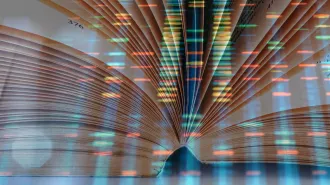By coating a nanoscale glass ball with gold and studding that metal with a forest of light-sensitive molecules, researchers in Texas have created what they say is the world’s first nanoscale pH meter. The litmus paper familiar from high-school chemistry class and other pH meters gauge how acidic or basic a solution is.
Injected deep into living tissue, the new nanobauble could take the chemical pulse of a single cell, potentially signaling conditions such as cancer or organ rejection, the inventors suggest.
The molecules of para-mercatobenzoic acid (pMBA) that make up the device’s light-sensitive forest emit radiation when hit by an infrared laser beam. The spectrum of the pMBA’s infrared emissions changes subtly in response to the pH of the surrounding fluid. The gold-coated core of the device amplifies the emissions.
“It’s a high-precision device,” says Naomi J. Halas of Rice University in Houston, who led its development. Injected into tissue, such meters could enable physicians or biology researchers to monitor cell pH by shining a laser on cells of interest and analyzing the return signals, she adds.
Halas and her colleagues describe their invention in the August Nano Letters.





